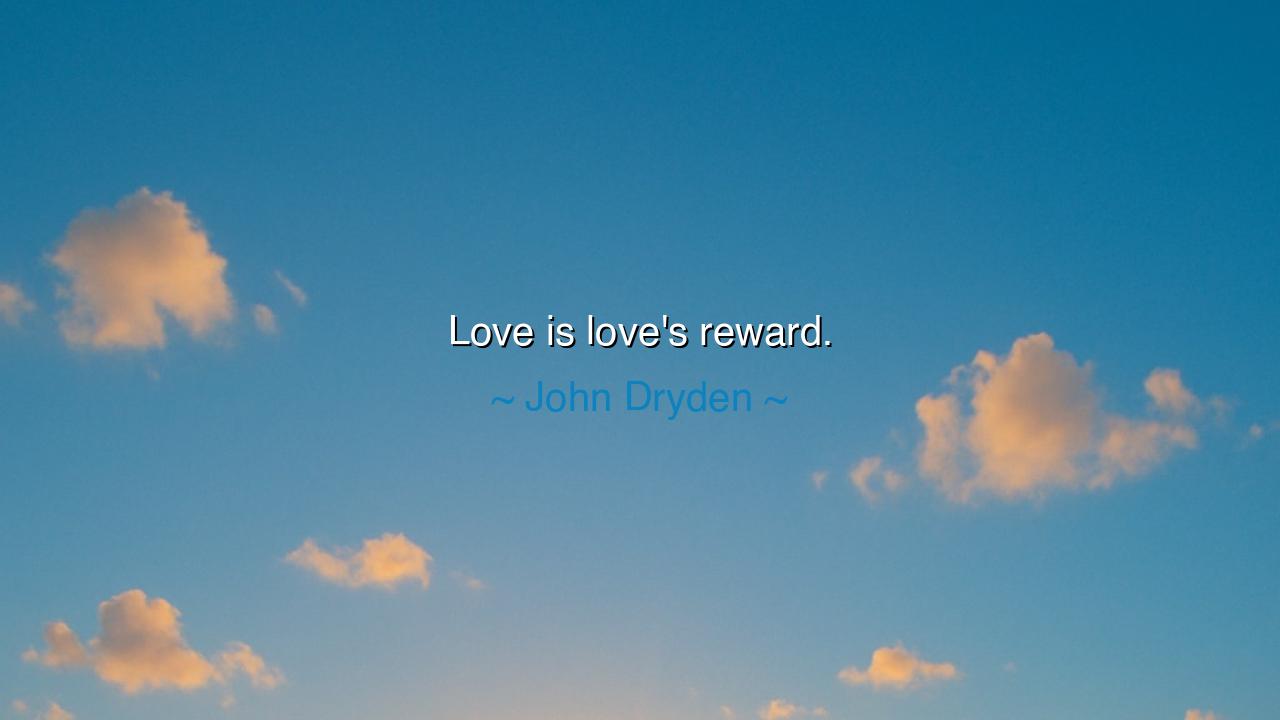
Love is love's reward.






John Dryden, a poet whose words ring with timeless wisdom, once declared, “Love is love’s reward.” This simple yet profound statement reveals the very essence of what love truly is—a force that rewards itself, not with external gifts or material riches, but with the inherent joy and fulfillment it brings to the heart. In the act of loving, we are not merely seeking something to gain, but the very act of love itself becomes its own reward. It is the giving, not the receiving, that transforms us. True love does not seek external validation or material benefits—it flourishes through the selfless act of caring, giving, and connecting with another. And in this, it finds its deepest purpose and its most genuine fulfillment.
In the ancient world, the philosophers often spoke of love as a higher form of connection, one that transcended selfish desires and led to a greater good. Socrates, in his dialogues, proposed that love is the force that moves the soul toward truth and wisdom, and that true love is not merely about the union of bodies, but the union of minds and hearts. Love, for the ancients, was a sacred force—a bond that elevated the individual, not through material rewards or personal gain, but through a deeper connection to the divine and to others. It was love’s ability to transform the self that made it the greatest of all human experiences.
The story of Achilles and Patroclus offers a powerful illustration of love’s reward. Achilles, the great hero of the Trojan War, was a man known for his strength and valor, yet it was his love for his companion Patroclus that truly defined him. When Patroclus was killed in battle, Achilles was so overcome by grief that he cast aside his own interests and sought vengeance, driven by his love and the need to honor the soul of his dear friend. Though his actions led to further conflict and tragedy, the love he had for Patroclus gave him the strength and determination to rise above his own ego. The reward of love, in this case, was not wealth or glory, but a deep, unshakeable sense of purpose and meaning that guided Achilles through his darkest moments.
Consider, too, the story of Shakespeare's Juliet and her devotion to Romeo. Their love, though doomed from the beginning, showed the ultimate reward of love: the ability to transcend the material world and the constraints of society. Though they faced familial conflict, their love was pure, selfless, and unwavering. In their tragic end, they achieved something deeper than mere happiness or success—they found a bond that defied all the limitations of the world. For them, love’s reward was the creation of a connection that would endure beyond their lives, a love that would forever be remembered and celebrated. The reward was not in the physical union or the material world, but in the eternal nature of their shared souls.
In our own lives, love’s reward manifests in ways both simple and profound. It is not always about receiving something in return for our affections, but about the act of giving itself. Loving another person—whether a partner, a friend, or a family member—is its own reward, for in loving, we become more attuned to the world around us, more aware of the needs of others, and more in touch with our own hearts. The reward of love is often not something we can touch or see, but something we feel deeply within: the warmth of connection, the joy of selflessness, and the peace that comes with knowing we have cared deeply for another.
John Dryden’s insight challenges us to rethink the way we view love in a world that often emphasizes self-interest and material gain. In our culture, we are taught that the reward of any action comes with some external payoff—a gift, a token, recognition, or success. But love’s reward is not so easily measured. It is not about what we receive, but about what we give. True love requires nothing in return; it is fulfilled in the very act of loving. Love’s reward is not seen in material wealth or recognition, but in the quiet, personal joy that comes from knowing we have touched another’s life.
The lesson to take from this is clear: love deeply and without expectation. Do not measure your love by what you gain, but by the impact it has on the world and on those you cherish. The true reward of love is not in the recognition or the external rewards we often seek, but in the act itself—the connection it creates and the joy it brings into our lives. Love is its own reward, and in offering love to others, we find the greatest fulfillment of all. So let your love be selfless, let it flow freely, and let it be the greatest reward you could ever receive.






AAdministratorAdministrator
Welcome, honored guests. Please leave a comment, we will respond soon